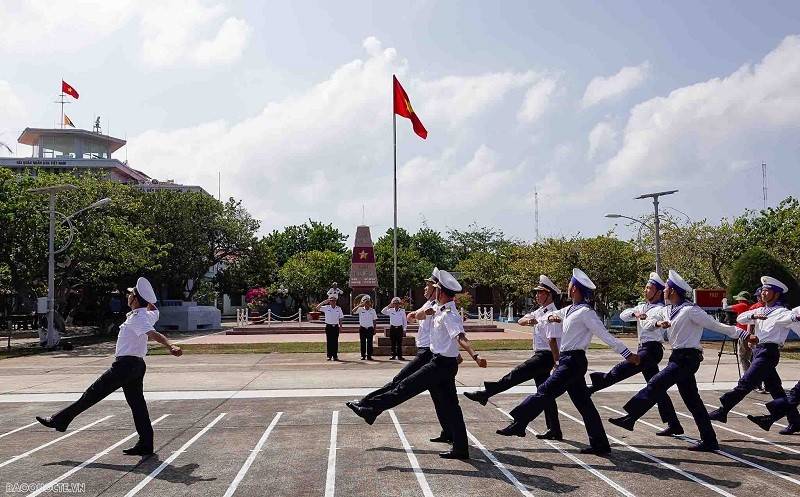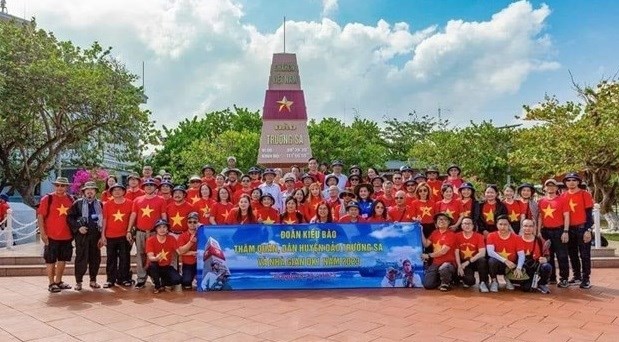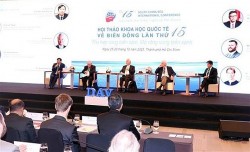
Determination to protect the Fatherland's sovereignty over the sea and islands (article 1):
Vietnam's stance and policy in resolving disputes in the East Sea
Latest
 |
| Parade activity during the flag-raising ceremony on Paracel Islands. (Photo: Nguyen Hong) |
Disputes over territorial sovereignty involving Vietnam can be mentioned as:
(1) Sovereignty disputes in the Paracel Islands between Vietnam and China along with the territory of Taiwan;
(2) Sovereignty disputes in the Spratly Islands involving five countries and one territory (Vietnam, the Philippines, Malaysia, Brunei and China along with the territory of Taiwan);
(3)The Scarborough Shoal dispute between the Philippines, China and the territory of Taiwa
Maritime delimitation disputes involving Vietnam can be mentioned as:
(1) The dispute concerns the nine-dash line claimed by China, which covers nearly 80% of the East Sea and overlaps with the exclusive economic zone claims of Brunei, Indonesia, Malaysia, the Philippines, the territory of Taiwan and Vietnam;
(2) The dispute in waters off the mouth of the Gulf of Tonkin between Vietnam and China;
(3) Maritime delineations between Vietnam and Cambodia, Vietnam and Malaysia in the Gulf of Thailand;
In addition to the two types of territorial disputes and the delimitation of overlapping maritime zones, the East Sea is also the subject of various types of disputes related to maritime activities of States in the implementation of freedom of navigation, freedom of overflight, marine scientific research, laying submarine cables and pipelines and so on.
Some states attach the issue of territorial sovereignty to maritime zones, arguing that only the settlement of territorial sovereignty disputes can provide the ground for maritime dispute resolution. The arbitral tribunal in the Philippines against China case in 2016 had the opinion that the two issues could be separated. Some countries in the region support this view.
Vietnam's stance and policy in resolving these disputes in the East Sea are reflected in the following main points:
First, Vietnam has consistently asserted sovereignty over the Paracel and Spratly Islands, in accordance with international law. This stance has been repeatedly affirmed in Party documents, white papers, statements of the Ministry of Foreign Affairs and speeches of spokespersons of the Ministry of Foreign Affairs of Vietnam, in international conferences, meetings, exchanges and negotiations with other countries.
Second, UNCLOS is the single, comprehensive and consistent document for resolving maritime disputes. The Vietnam National Assembly's resolution approving UNCLOS 1982 on June 23, 1994 clearly stated that "by ratifying the UN Convention on the Law of the Sea in 1982, Vietnam has expressed its determination to join the international community in building a fair legal order, encouraging development and cooperation at sea". The resolution showed Vietnam's clear stance on the marine approach and the role of UNCLOS 1982.
First, building a just and fair legal order at sea was Vietnam's first and highest goal when it acceded to UNCLOS in 1982. Vietnam believes that UNCLOS 1982 is an instrument to build and ensure a just and fair legal order at sea.
Second, Vietnam encourages development and cooperation at sea. UNCLOS 1982 will be the legal framework that facilitates and regulates this development and cooperation at sea. Third, UNCLOS is a single, comprehensive and consistent document for settling maritime disputes. Fulfilling its obligations as a member of UNCLOS 1982 helps Vietnam ensure all three objectives in the use of the sea, namely a just and fair legal order, development and cooperation at sea.
 |
| Overseas Vietnamese pose for a group photo in Truong Sa. (Source: VNA) |
Third, Vietnam has a consistent policy on the peaceful settlement of international disputes. This is one of the fundamental principles of international law, enshrined in Articles 2 (4) and 33 of the UN Charter. Measures for peaceful settlement of disputes vary, including negotiation, mediation, investigation, conciliation, arbitration, court...
At the same time, the basis for resolving disputes in the East Sea is international law. For disputes over the sovereignty of the Paracel and Spratly Islands, the territorial acquisition by effectivité is actually the applicable law. For the remaining types of disputes, UNCLOS 1982 is a single, comprehensive and consistent legal instrument used as a basis in negotiations with States and in studying the possibility of application of binding legal means as provided for in Part XV of the Convention.
So far, Vietnam has mainly used negotiating methods to resolve disputes over maritime delineation with countries bordering the East Sea. Many disputes over Vietnam's maritime delineation with other countries have been settled peacefully and the parties have been able to sign maritime agreements through negotiations.
| More from WVR |
 15th East Sea International Conference promotes mutual understanding: Experts 15th East Sea International Conference promotes mutual understanding: Experts |
Some examples can be added typically as: Agreement on maritime delimitation in the Gulf of Thailand between Vietnam and Thailand in 1997, Agreement on the delimitation of territorial sea, exclusive economic zone and continental shelf in the Gulf of Tonkin between Vietnam and China in 2000, Vietnam-China Gulf of Tonkin Fisheries Cooperation Agreement in 2000, Agreement on the Continental Shelf Delimitation between Vietnam and Indonesia in 2003, Agreement on Delimitation of Exclusive Economic Zone between Vietnam and Indonesia in 2022.
However, Vietnam believes that countries that have the right to choose peaceful means to settle international disputes, do not exclude the use of juridical measures. The use of juridical measures in dispute settlement is a civilized measure enshrined in the UN Charter as well as in UNCLOS 1982, which helps to avoid possible conflicts and can lead to an equitable solution acceptable to all parties.
Vietnam's general policy and stance on the East Sea issue are in accordance with the provisions of international law, especially UNCLOS 1982. This is evident through the joint documents and statements of high-level meetings, ASEAN ministerial meetings and related ASEAN meetings with partner countries such as ARF, EAS, PMC... noting many similarities with Vietnam's position on the East Sea issue such as settling disputes by peaceful means, not using or threatening to use force, settlement in accordance with UNCLOS 1982; respect for the just and fair legal order at sea; UNCLOS 1982 is the basis for defining the right of States to sustainably use the seas, and enjoy the sovereign rights, jurisdiction and legitimate interests in the seas.









